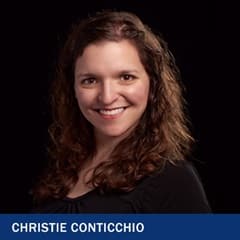How to Become an Accountant

Understanding the numbers
When reviewing job growth and salary information, it’s important to remember that actual numbers can vary due to many different factors—like years of experience in the role, industry of employment, geographic location, worker skill and economic conditions. Cited projections are based on Bureau of Labor Statistics data, not on SNHU graduate outcomes, and do not guarantee actual salary or job growth.
How do you pursue an accounting career path and succeed at it? Earning a degree is a good place to start.
With a bachelor's degree, you can position yourself for one of the many different types of accounting careers. And should you decide to earn an advanced degree — such as a master's in accounting — you can broaden your job prospects and income opportunities even further.
A degree can also help you meet or work toward the credit hour requirements needed to earn professional industry designations, such as a Certified Public Accountant (CPA) or Certified Management Accountant (CMA) certification.
Thanks to globalization, a strong economy and complex tax regulations, accounting is an in-demand field, with 4% job growth projected through 2032, according to the U.S. Bureau of Labor Statistics (BLS).* And in 2023, the median annual salary for accountants and auditors was $79,880, BLS reported.*
You might be wondering what you can do to stand out in this field, and a degree is a good place to start.
What Degree is Best for Accounting?
Whether you follow a traditional path as a public accountant or choose a specialty like financial accounting, you can’t go wrong with an accounting degree.
At the bachelor's level, you have a couple options:
- Accounting degree: If becoming certified in the field is a goal of yours, a general accounting bachelor's degree can help you progress toward the requirements needed for CPA licensure. The degree can also help you if you're interested in tax accounting or auditing, to name just a couple of paths.
- Accounting and finance degree: This path is beneficial if you want to build foundations in both business areas and understand how you can help organizations achieve financial success.
Within these degree programs, there are often concentration options you can consider.
A forensic science accounting concentration, for instance, can prepare you to specialize in the field and detect and prevent financial fraud in organizations.

You might also consider a concentration in management accounting.
Management accounting is useful in many roles, such as entry-level accountant, auditor, accounting analyst, controller and even chief financial officer, according to Eric Sumners, an auditor and adjunct faculty member at Southern New Hampshire University (SNHU). He said this concentration can help you gain decision-making and planning skills that are relevant in a variety of sectors, such as:
- Consulting
- Government
- Not-for-profit
- Retail
- Service
Not sure you’re ready to commit to a full degree program? Consider an associate degree in accounting or an undergraduate accounting certificate, which can help you meet the education requirements for entry-level positions like bookkeeping or lay the groundwork for further study.
While you pursue your degree, you may also want to consider employment in the field to gain real-world experience, connect with professional associations and network with alumni via social media.
“Accounting is a great major because there are so many options,” said Mona Stephens, a CPA with a Master of Accountancy and an accounting faculty lead at SNHU.

What Does an Accountant Do?

That’s changed a lot over the years, but an accountant's mission has not. “The overall purpose of accounting is to tell the financial story of an organization (or individual) to allow for informed decision-making,” Stephens said.
But the bean counters of the past now use cutting-edge technology and data to tell stories with numbers.
“While the purpose of accounting hasn’t changed since I first became one, the tools we use and skill sets we need have changed,” she said. "Accountants now need to have good communications skills, technology skills and the ability to analyze large amounts of data.”
If you become an accountant, what you do will also depend on your role and where you work.
“Everyone’s career path is a bit different,” said Stephens. “It’s easier if you already know what you want to do. Do you want to go into public accounting, work within an organization as a management accountant, do taxes, work in government or a nonprofit, be an auditor?"
As for Stephens, she joined the field as a county auditor before moving into local government, where she spent 25 years.
Common Types of Accounting Jobs
Accountants do much more than prepare tax returns, and CPAs are only one type. Here are just a few common titles:
- Auditors review an organization’s financial records. Within the auditing category are information technology auditors. Their job is to check the accuracy and sources of financial data in technology systems. Another type of auditor is the internal/external auditor, who ensures the proper use of financial resources and looks for ways to reduce waste.
- Financial accountants do the requisite financial reporting to prepare statements for shareholders, creditors, potential investors and the general public. Financial accounting has a hand in improving an organization’s fiscal position.
- Government accountants maintain and prepare government records or those of private businesses that interface with government entities.
- Public accountants audit and prepare tax returns for companies, government entities or individuals. Many work for large accounting firms and go on to open their own agencies. Some have specialties, such as forensic accounting.
- Management accountants help company management with budgets, cost analysis and strategic planning. Management accounting often involves making recommendations to streamline operations and drive business decisions.
- Tax accountants prepare taxes and do income taxation planning for individuals, corporations and partnerships.

“It’s a very exciting field,” said Bryan Bouchard '01 '04MBA, an assistant professor in the accountancy and taxation department at SNHU’s Manchester, New Hampshire, campus. “Despite the image one may have of accountants, it is a constantly changing field as rules and guidelines change all of the time. A good accountant never stops learning.”
Bouchard, who holds both a Master of Business Administration (MBA) and a Master of Science in Finance from SNHU, is a CMA and on the board for the New Hampshire chapter of the Institute of Management Accountants. He has taught accounting for over two decades.
Prospects are good no matter which type of accounting you pursue. However, “the growth areas now are in financial (data) analysis and regulatory compliance, in addition to staff accountants,” said Stephens. “And as the economy grows, opportunities for accountants naturally grow.”*
Other Jobs You Can Get with an Accounting Degree
If your ultimate goal is to work in a field indirectly related to accounting, an accounting degree can still help you get there.
Similar roles of interest include:
Budget Analyst
A budget analyst works with government agencies, private companies and universities to prepare budget reports and help them plan their finances.
A budget analyst earned a median salary of $84,940 in 2023, with a 3% job growth through 2032, according to BLS.*
Financial Analyst
A financial analyst works with individuals and organizations to make strategic decisions based on shareholder interests, stock viability, growth expectations, competition and more.
Financial analysts earned a median salary of $99,890 in 2023, with a 8% job growth through 2032, according to BLS data.*
Discover how to become a financial analyst.
Personal Financial Advisor
Personal financial advisors provide advice to help individuals with their present and future financial needs, whether it be insurance, investments and taxes.
Personal financial advisors earned a median salary of $99,580 in 2023, with a 13% job growth through 2032, BLS said.*
Discover how to become a financial advisor.
What Qualities Do You Need to Be an Accountant?
According to Stephens, the better your soft skills, the better your chances of success. And communication and teamwork are key.
“It’s very important for accountants to be able to effectively communicate and work with non-accountants,” she said.
The best accountants also possess attention to detail, excellent organizational skills and critical thinking skills, BLS said. They also have a knack for solving problems.
Stephens summed it up this way: “My favorite part of the job is figuring out the story the numbers are trying to tell us and then telling that story to others, so we can make good decisions.”
Accounting is an ideal field to enter if you’re great with numbers. “You have to have analytical skills and be comfortable with numbers,” Bouchard said. “A good accountant is someone who pays close attention to detail.”
Stephens said if she were starting out in accounting today, she would take courses in data analytics. “Big data and technology are changing what we do, and newer technologies are doing many of the manual tasks we used to do," she said. "Now accountants add value by extracting and interpreting data, then helping others make useful decisions based on the data.”
Sumners also mentioned that it's a good idea to have an understanding of auditing.
"Knowledge of auditing concepts and evidence is an important skill even if you are not working as an auditor," he said.
He said that some roles, like management accountants, will regularly work with auditors.
How Do I Become a CPA?
Recently, the way CPAs are tested changed. In January 2024, a new CPA exam, known as the CPA Evolution, was launched.
Candidates can now choose their main discipline for the exam, according to the Association of International Certified Professional Accountants and Chartered Global Management Accountant. The options are:
- Business Analysis and Reporting
- Information Systems and Controls
- Tax Compliance and Planning
However, under CPA Evolution, all candidates must also pass the three core sections:
- Auditing and Attestation
- Financial Accounting and Reporting
- Taxation and Regulation
"The CPA exam covers a wide range of subjects all of which are important to accountants in an array of business and government sectors," said Sumners.
As a result of these changes, some schools examined their accounting programs to ensure they aligned with the new exam and can best prepare the public accountants of the future for the certification process.
Find Your Program
Are Accounting Degrees Worth It? One Career-changer's Experience

Thinking about a career change? Christie Conticchio '14G made the leap from education to accounting in her late 20s. She returned to school to earn a master's in accounting online at SNHU, which helped her transition from teaching middle school by taking her time, staying disciplined and keeping faith in her convictions.
“It took me about four and a half years to get my master’s because I was working full-time as a teacher,” Conticchio said. “Because of my demanding schedule, I could only manage one class at a time. But that also helped me do better."
Now she's an accounting analyst and the administrator of several platforms and programs used in the field. In her role, she also creates rules, tests data and ensures its integrity, manages accounts and assists other users.
"SNHU provided me with the education and experience I needed to transfer knowledge to the real working environment," Conticchio said. "My career path has not been a straight line at all, and I think that it is important for the next generation to know that sometimes the path we walk takes us down a lot of different side roads."
Although there are many avenues you can take as an accounting major, Conticchio recommends “gaining experience in the branch you feel confident,” either through internships or interdepartmental moves.
“If you don’t know what that is yet, start with your classes,” she said.
She also looked to one of her advisors at SNHU, who encouraged her to identify the transferrable skills gained in her teaching career and seek out entry-level jobs to get her start in accounting.
If you're interested in an accounting career, Conticchio encourages you to take a chance — and to be gentle with yourself during the process. "(Take) it one day at a time and one doable task at a time," she said. "Give yourself grace when learning something new in any environment."
A degree can change your life. Find the SNHU accounting program that can best help you meet your goals.
*Cited job growth projections may not reflect local and/or short-term economic or job conditions and do not guarantee actual job growth. Actual salaries and/or earning potential may be the result of a combination of factors including, but not limited to: years of experience, industry of employment, geographic location, and worker skill.
Betty Egan is a freelance copywriter with 25+ years of experience across a diverse spectrum of industry sectors, including higher education. She lives and works remotely from the mountains of northern New Hampshire. Connect with her on LinkedIn.
Explore more content like this article

Academic Spotlight: Monique Jordan, Academic Dean of Online Product Health for Business Programs

Academic Spotlight: Dr. Ashley Dellosa, Associate Dean of Business

What Does a Bookkeeper Do? A Look Into the Role and Necessary Skills
About Southern New Hampshire University

SNHU is a nonprofit, accredited university with a mission to make high-quality education more accessible and affordable for everyone.
Founded in 1932, and online since 1995, we’ve helped countless students reach their goals with flexible, career-focused programs. Our 300-acre campus in Manchester, NH is home to over 3,000 students, and we serve over 135,000 students online. Visit our about SNHU page to learn more about our mission, accreditations, leadership team, national recognitions and awards.

